50+ AI in Healthcare Statistics 2024
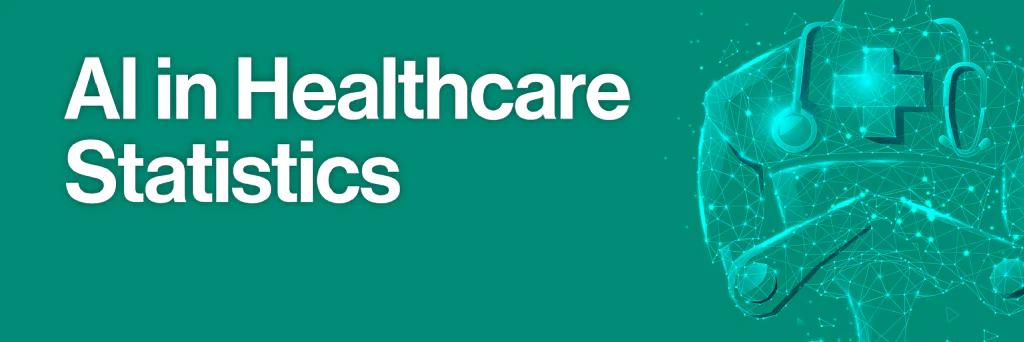
A Deloitte survey found that about half (53%) of consumers believe generative AI will improve access to healthcare, while a further 46% think AI will make healthcare more affordable for ordinary Americans.
With this in mind, AIPRM felt it was the perfect time to produce the definitive page on AI in healthcare statistics, including the perceptions of healthcare providers and patients, alongside global and national revenue from AI in the healthcare sector.
10 interesting facts about AI in healthcare #
- Between 2020 and 2023, the market size of AI in healthcare grew by 233%, from $6.7 billion to $22.4 billion.
- The USA is forecast to generate $102.2 billion in revenue by 2030 through AI in the health sector.
- China is expected to see the largest growth in revenue generated by AI in healthcare, increasing by around two-fifths (42.5%) between 2023 and 2030.
- Nearly two-thirds (64%) of clinicians in South America believe the majority of their decisions will be benefitted by AI.
- More than half (53%) of EU healthcare organizations plan to use medical robotics by the end of 2024.
- A quarter (25%) of US hospitals already use predictive analysis driven by AI.
- Three in five (60%) patients would feel uncomfortable if their healthcare provider relied on AI.
- A third of Americans (33%) felt that AI would lead to worse outcomes for patients.
- Two-thirds of American women (66%) were very or somewhat uncomfortable with AI gaining more prominence within healthcare.
- Four in five (80%) pathologists believe AI will boost life expectancy.
AI in healthcare market size statistics #
AI in healthcare statistics indicate that the market has grown considerably and shows no sign of slowing down. As of 2024, the AI in healthcare market stood at $32.3 billion.
AI in healthcare global market size (2016-2030) #
AI in the healthcare market has exploded in value since 2016. Between 2016 and 2023, its market size grew from $1.1 billion to $22.4 billion, representing a rise of 1,779%.
Between 2022 and 2023 alone, the market grew by close to half (45%) from $15.4 billion to $22.4 billion.
A breakdown of the global AI market size in healthcare #
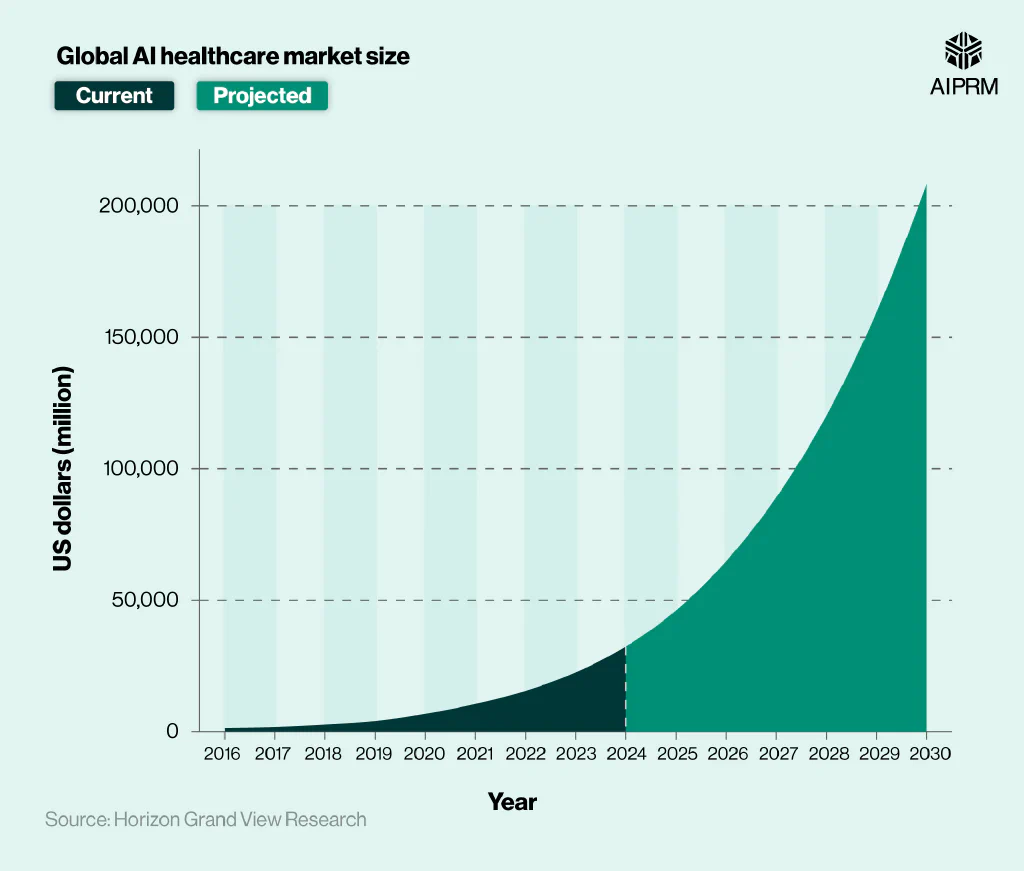
The single biggest increase in a single year came between 2019 and 2020. The market size of AI in healthcare rose 72.4% from $3.9 billion to $6.7 billion in this short time period.
The rate of growth is expected to show no signs of slowing. Between 2023 and 2024, the market size of AI in healthcare is projected to rise by two-fifths (42%), with another rise of 40% expected by 2025.
Between 2024 and 2030, the market is projected to grow by 524% from $32.3 billion to $208.2 billion.
Revenue and CAGR
Compound Annual Growth Rate, measures an investment's mean annual growth rate over a specified period, accounting for compounding.
differences broken down by region/country
#
Of the countries listed, the USA had the highest revenue for AI in healthcare as of 2023, with a revenue of $11.8 billion. This is close to nine times more than the UK, and 15.5 times more than India.
A breakdown of the revenue and CAGR differences broken down by region/country #
| Revenue 2023 | Forecast 2030 | Growth (2024-2030) | |
|---|---|---|---|
| USA | $11,819.4 | $102,153.7 | 36.1% |
| Canada | $1,133.8 | $10,767.3 | 37.9% |
| Germany | $687.1 | $6,618.1 | 38.2% |
| France | $714.2 | $7,077.9 | 38.8% |
| Italy | $96.5 | $739.3 | 33.8% |
| Spain | $162.9 | $1,514.3 | 37.5% |
| Russia | $201.5 | $1,847.5 | 37.2% |
| UK | $1,326.2 | $12,493.8 | 37.8% |
| Japan | $917.3 | $10,890.9 | 42.4% |
| China | $1,585.5 | $18,883.6 | 42.5% |
| India | $758.8 | $8,728.0 | 41.8% |
| Australia | $197.6 | $2,157.3 | 40.7% |
| South Korea | $352.8 | $3,809.1 | 40.5% |
| Singapore | $78.1 | $881.3 | 41.4% |
| Mexico | $56.2 | $593.8 | 40.0% |
| Argentina | $35.5 | $304.8 | 36.0% |
| Brazil | $84.1 | $789.4 | 37.7% |
| South Africa | $15.3 | $116.3 | 33.6% |
| Saudi Arabia | $22.8 | $191.3 | 35.5% |
| UAE | $17.2 | $137.9 | 34.6% |
(Source: Grandview Research)
The country with the highest projected growth is China, where revenue is expected to increase by more than two-fifths (42.5%) by 2030, from $1,585 million to $18,883 million. The country with the highest expected growth in Europe is France, with a projected growth of 39.5% by the end of the decade.
A breakdown of the forecast revenue for AI in healthcare in 2030 #
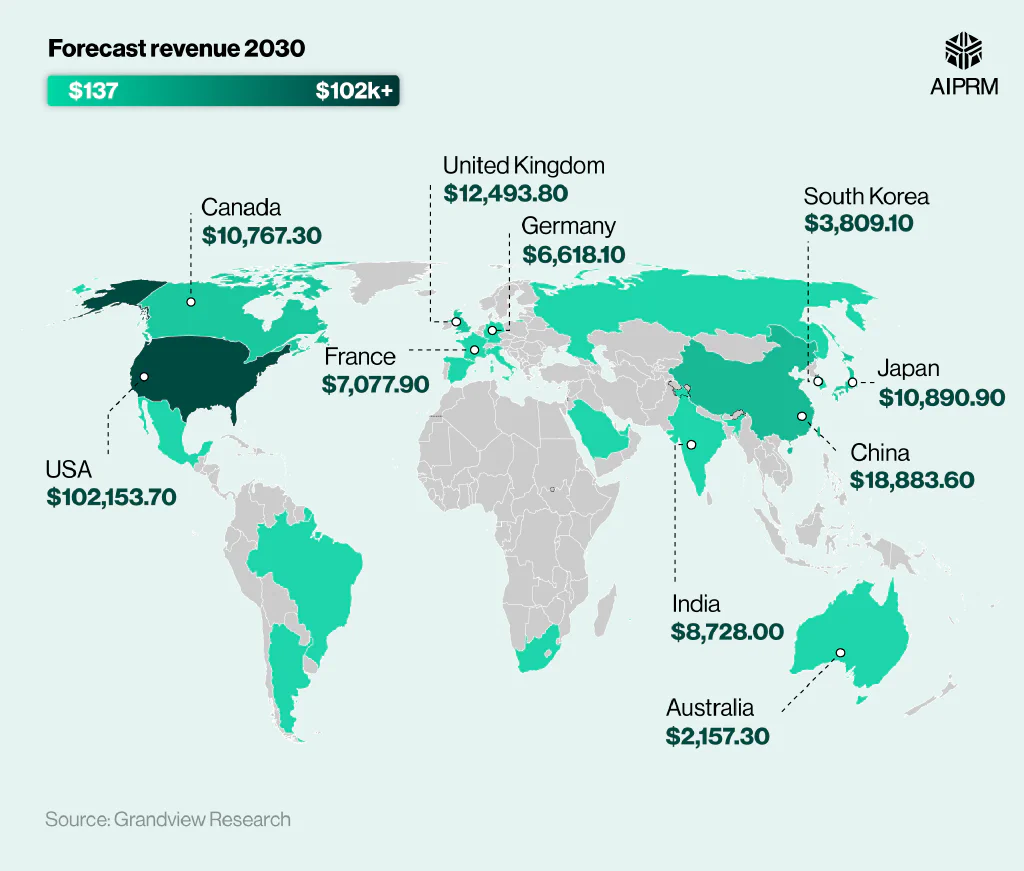
By 2030, projections expect the US market to be 10 times that of neighbouring Canada, and 55 times that of Russia.
AI in healthcare usage statistics #
AI use in healthcare statistics suggest that clinicians in South America and Asia Pacific are more optimistic and open to the influence of AI in healthcare than any other continent.
In both these parts of the world, nearly two-thirds (64%) believe that the majority of their decisions will be influenced by AI in 10 years’ time.
A breakdown of clinicians who believe the majority of their decisions will be influenced by AI in 10 years time #
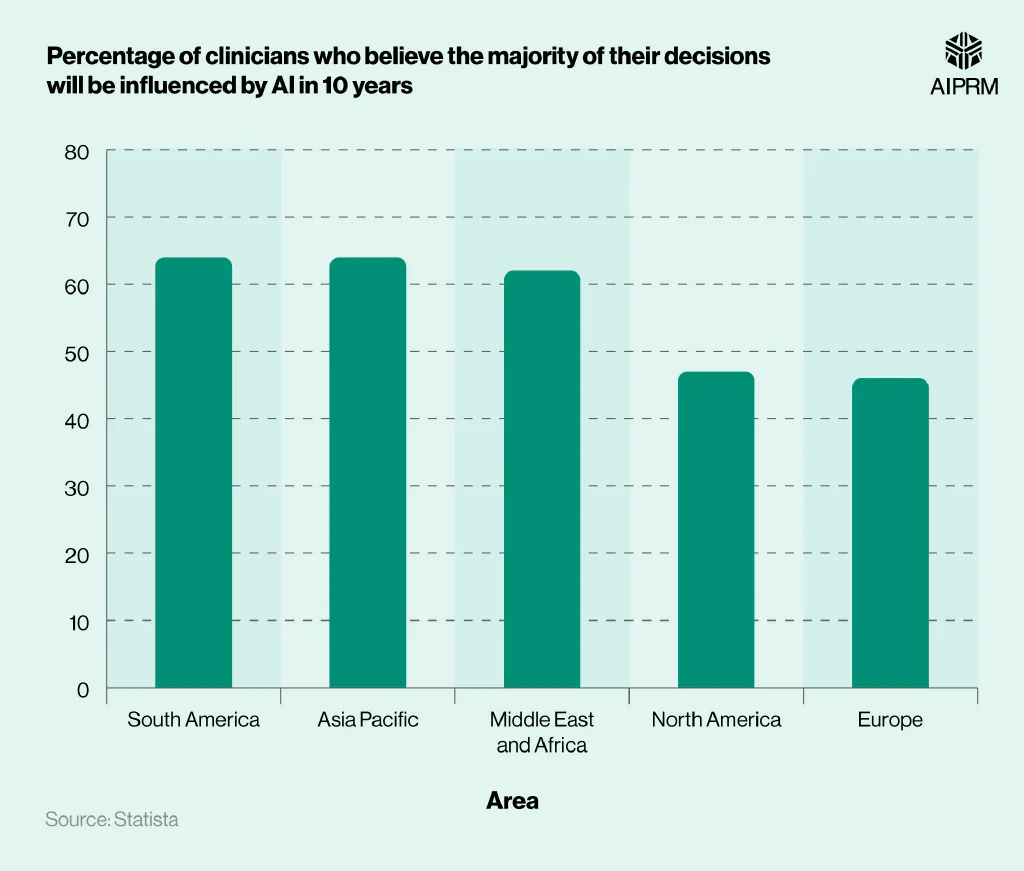
North America and Europe were the only regions where fewer than half of clinicians believed that AI would have such an influence on decision-making. The data shows that around a fifth (18%) more clinicians in South America believed that AI would play such an integral role in their jobs within ten years in comparison to clinicians in Europe.
A breakdown of the share of AI technologies used or planned to be used in the healthcare sector in the European Union as of 2021 #
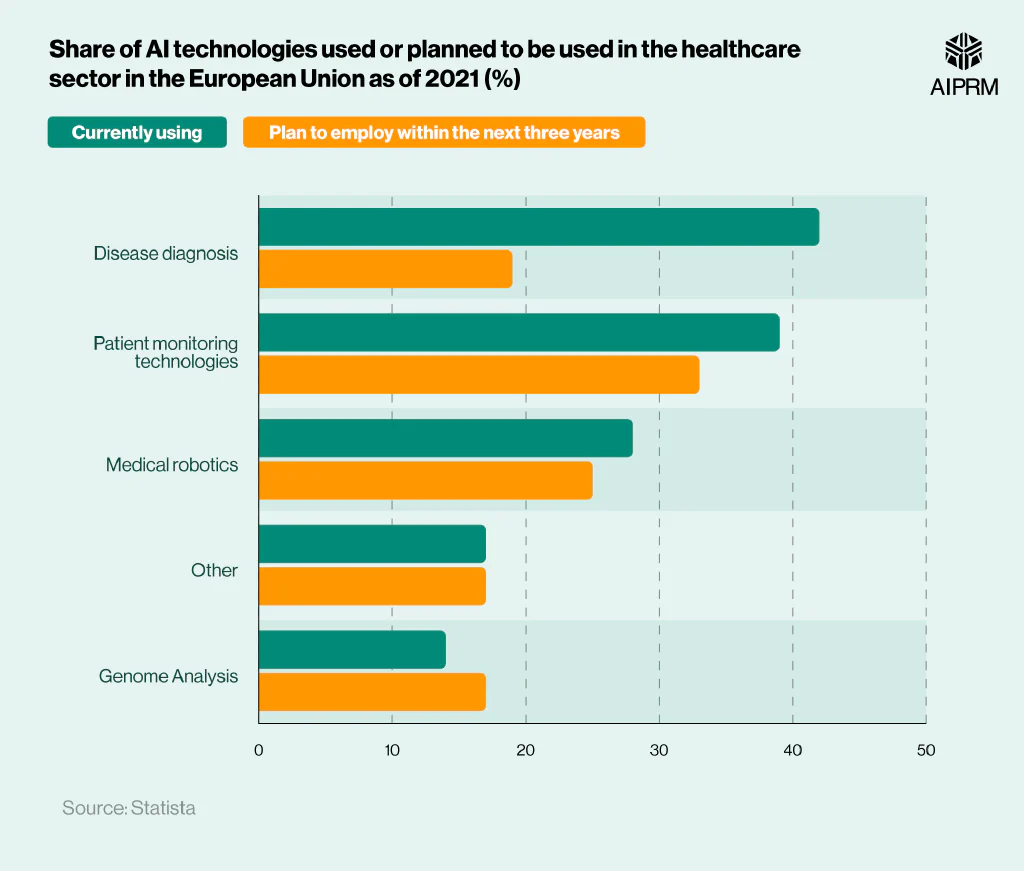
AI usage in healthcare statistics show that in the EU, disease diagnosis is the leading use of AI in healthcare, with more than four in 10 (42%) healthcare organizations using AI for this purpose.
In addition to this, close to one in five (19%) medical organizations plan to use AI for disease diagnosis within three years. This means that by the end of 2024, more than six in 10 (61%) of healthcare organizations in the EU plan to use AI for disease diagnosis.
However, this is expected to be eclipsed by the number of healthcare organizations using AI for patient monitoring technologies. Seven in 10 (72%) healthcare organizations are anticipated to use AI for patient monitoring, 11% more than disease diagnosis.
How is AI currently being used in healthcare? #
AI in healthcare statistics show that the ability to use AI for clinical decision support tools was the priority for the largest proportion of respondents. Close to three in 10 (29%) felt this would have the most positive impact on patients.
A breakdown of what US hospitals want to prioritize the use of AI for as of 2023 #
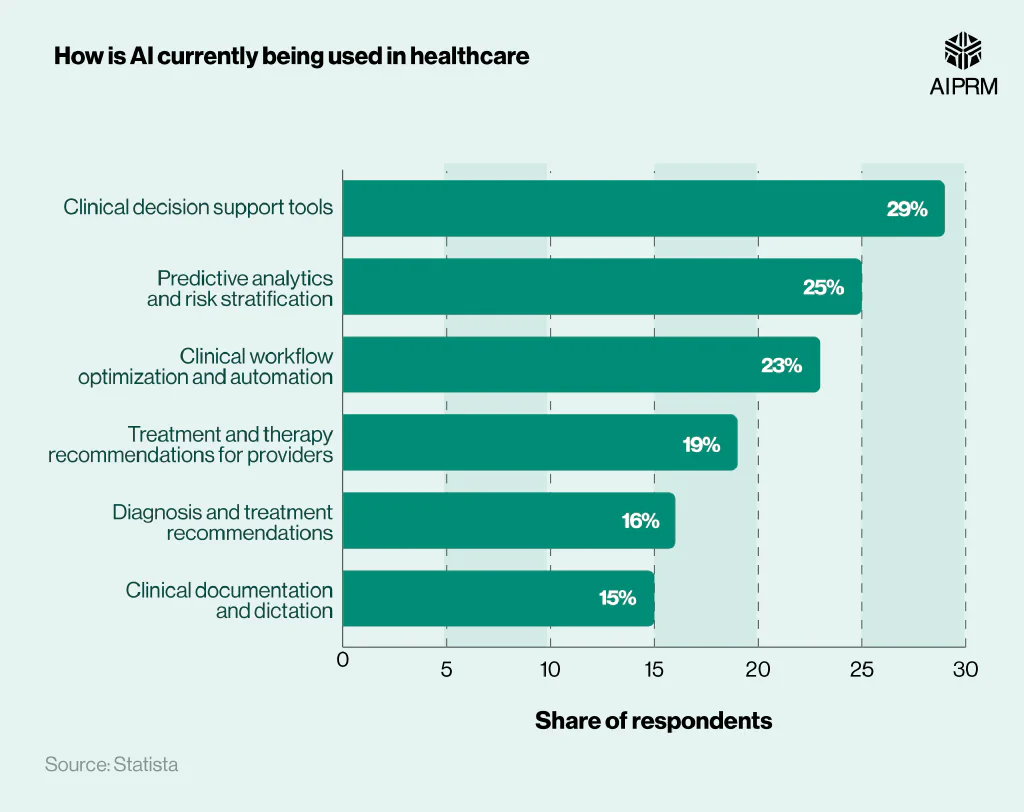
A quarter (25%) felt that predictive analytics and risk stratification was the process to prioritize. The use that got the least amount of support from healthcare organizations was clinical documentation and dictation, with just 15% feeling that this was a priority.
The use of generative AI in healthcare #
Generative AI in healthcare statistics show that the US market size was $1.07 billion in 2022. This then increased by more than four-fifths (82%) within the space of two years to $1.95 billion.
A breakdown of generative AI in healthcare market size, 2022 to 2032 #
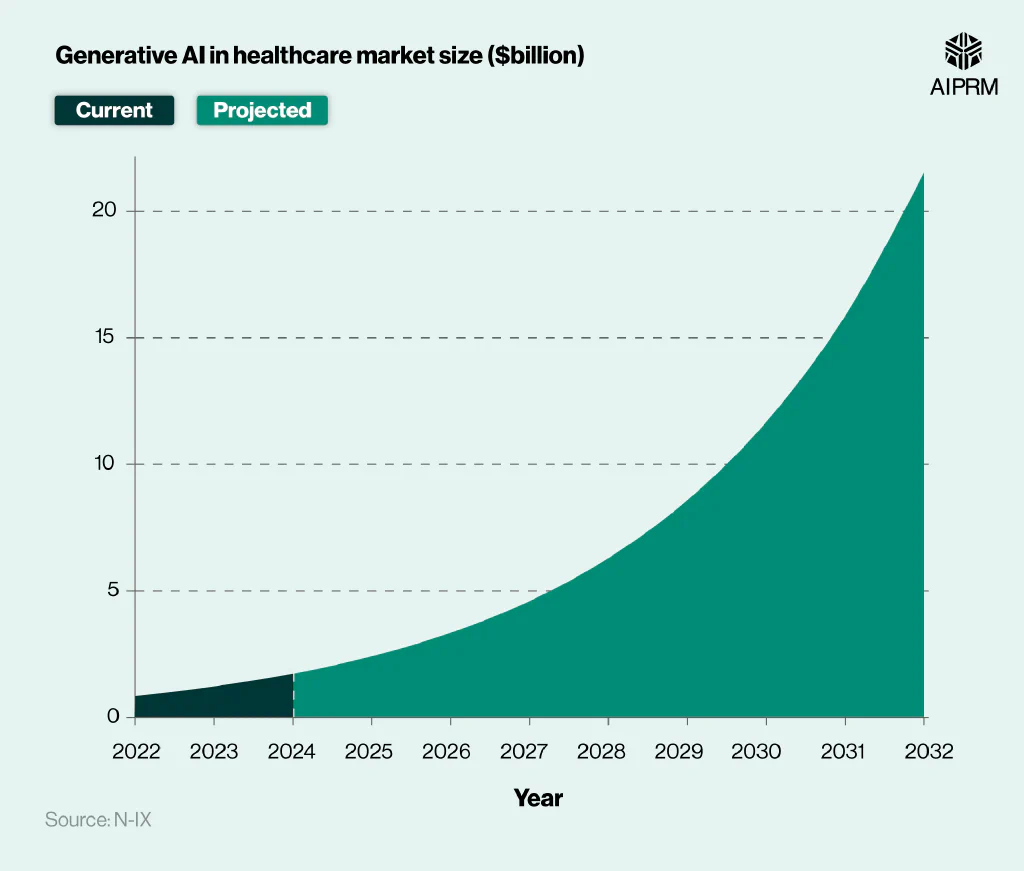
Projections show that by 2025, the generative AI market in healthcare is set to be worth more than $2 billion for the first time in history. Between 2025 and 2028, the market is set to increase by a further 146%.
By 2030, the market value for generative AI in healthcare is set to exceed $10 billion. In the following two years, the market is expected to grow again by 82%, reaching a value of $21.74 billion.
Attitudes towards AI in healthcare #
What do patients think about AI in healthcare? #
Data from the Pew Research Center shows that six in 10 (60%) Americans would feel uncomfortable if their healthcare provider relied on AI for their medical care.
A breakdown of how patients would feel if their healthcare provider relied on AI for their medical care #
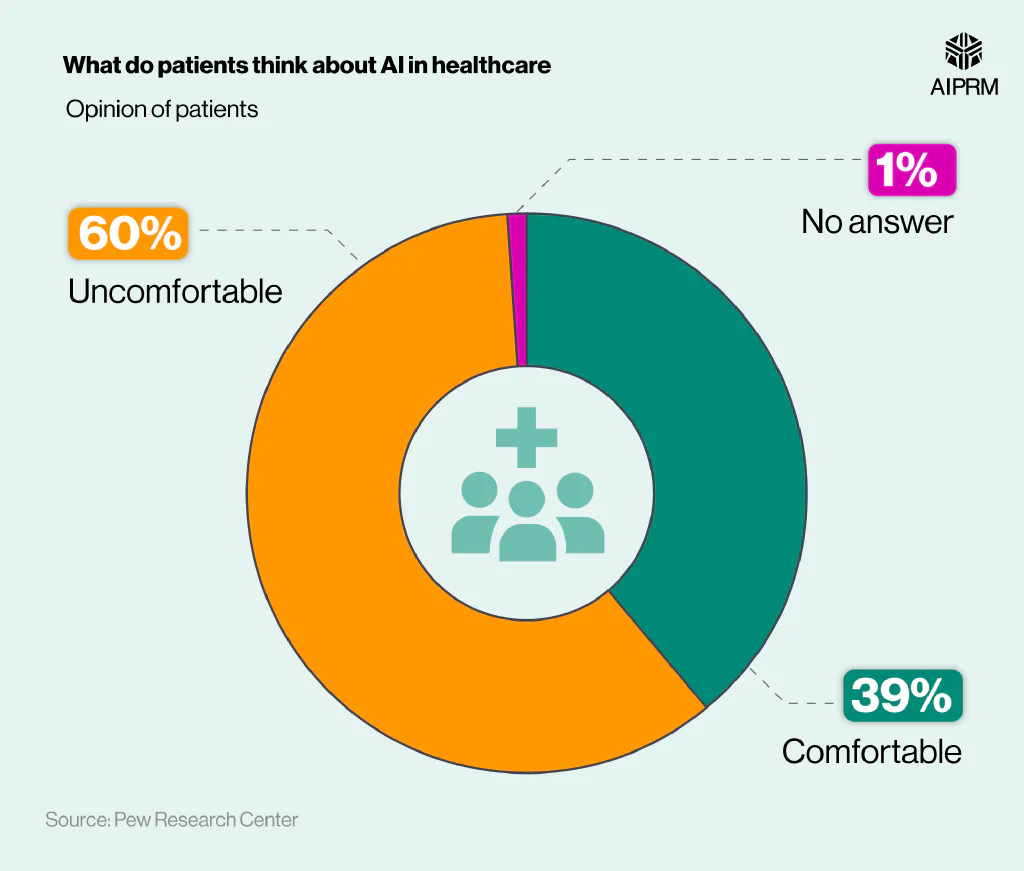
Around four in 10 (39%) felt comfortable about the idea of relying on AI for their medical care, while 1% had no answer to the question.
A breakdown of US adults who feel AI would lead to better or worse healthcare outcomes for patients #
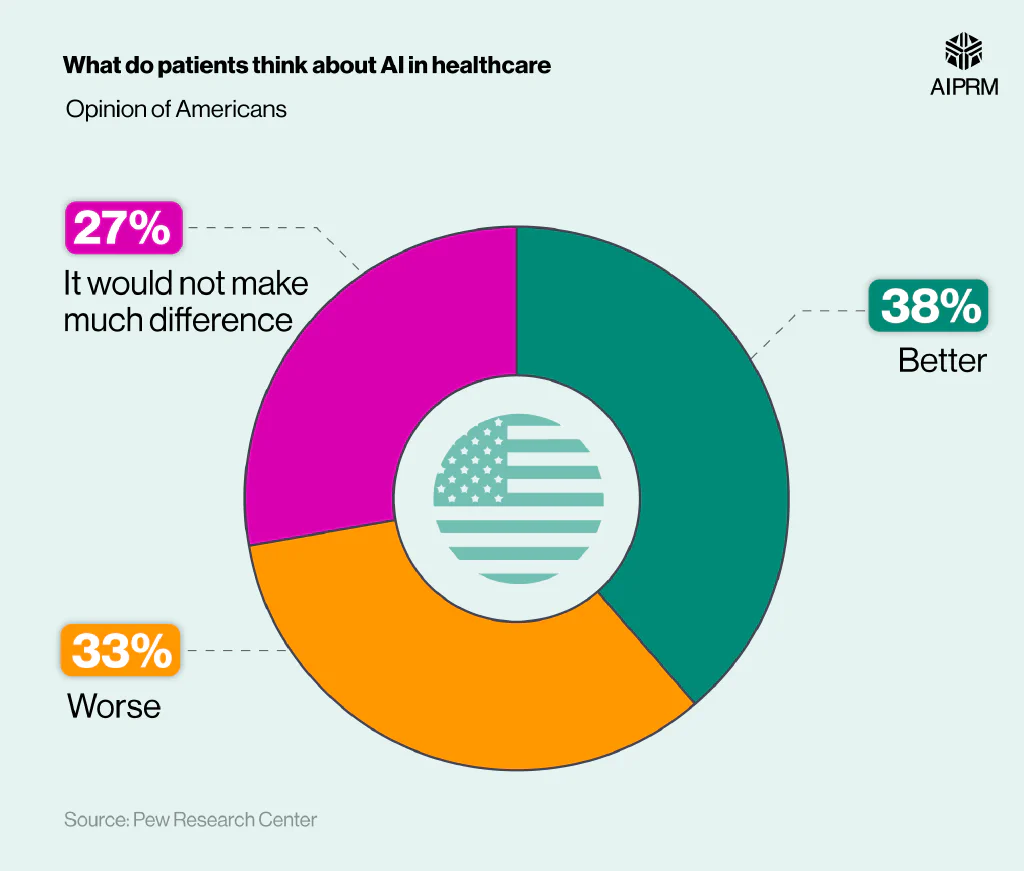
Despite their discomfort with the idea, more US adults felt that AI would lead to better healthcare outcomes for patients than worse.
Almost two in five (38%) Americans felt that healthcare outcomes would improve due to the use of AI, while around a third (33%) felt it would get worse. Just over a quarter (27%) felt it would make no difference at all.
A breakdown of US adults who feel that AI will be adopted within healthcare too fast or too slow #
| Move too slowly using this technology, missing opportunities to improve patients' health | Move too fast using this technology before fully understanding the risks for patients | |
|---|---|---|
| US adults | 23% | 75% |
| Among those who have heard a lot about AI | 29% | 70% |
| Among those who have heard a little about AI | 22% | 77% |
| Among those who have heard nothing about AI | 21% | 75% |
(Source: Pew Research Center)
The overriding concern among US adults is that healthcare providers will rush through the use of AI in healthcare without understanding the risks associated with it or knowing about unintended consequences. This was the opinion of three-quarters (75%) of respondents.
Those who felt they knew a lot about AI were less concerned about rushing its integration into healthcare, but seven in 10 (70%) still had reservations. At the same time, nearly three in 10 (29%) felt there were risks associated with holding back the progression of AI in healthcare.
The group with the most concerns about rushing AI in healthcare were those who knew a little about it. They were less uncomfortable than respondents who knew nothing about AI.
A breakdown of the perception of AI in healthcare by gender #
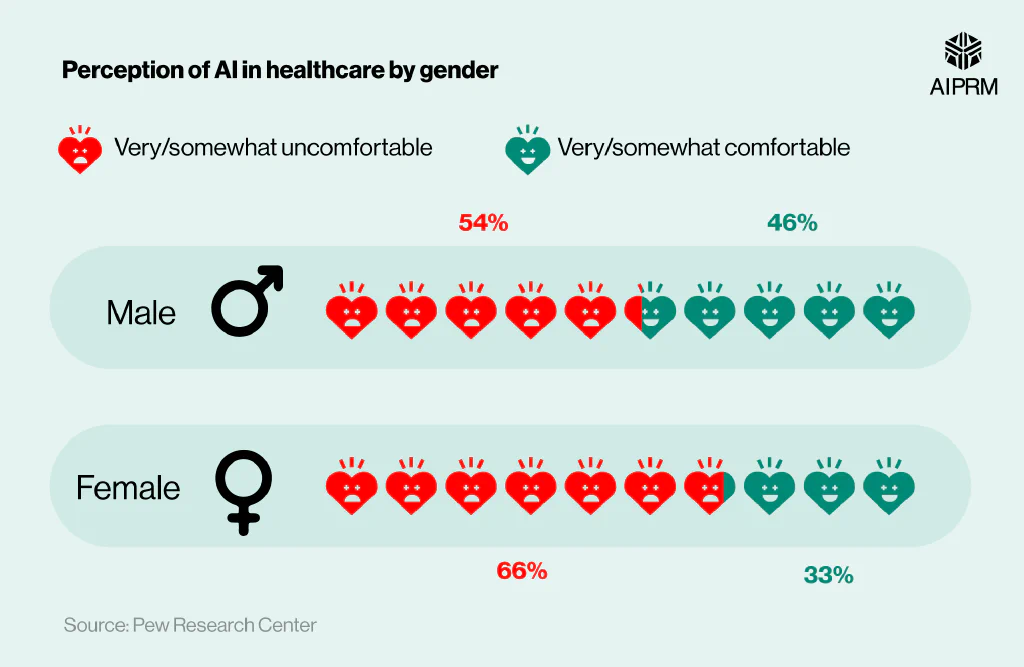
Data from the Pew Research Center shows that more women were uncomfortable with the use of AI in healthcare than men. Just over half of men (54%) considered themselves very or somewhat uncomfortable with AI in healthcare – 12% less than women by comparison.
In total, two-thirds (66%) of women were very or somewhat uncomfortable with AI’s prominent role in healthcare.
A breakdown of the perception of AI in healthcare by race #
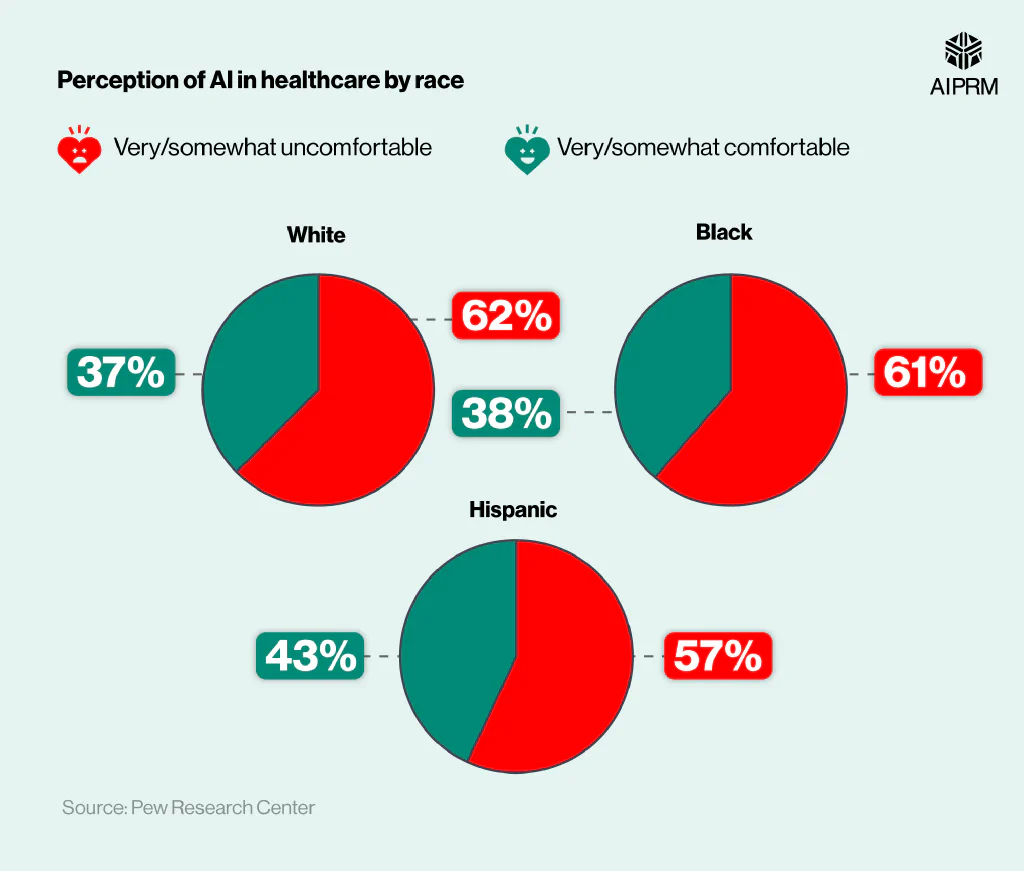
AI in healthcare statistics indicate that white patients are the most uncomfortable with the idea of AI playing a prominent role in healthcare. Just over six in 10 (62%) felt this way – 1% greater than black US adults and 5% greater than Hispanic patients.
A breakdown of the perception of AI in healthcare by age #
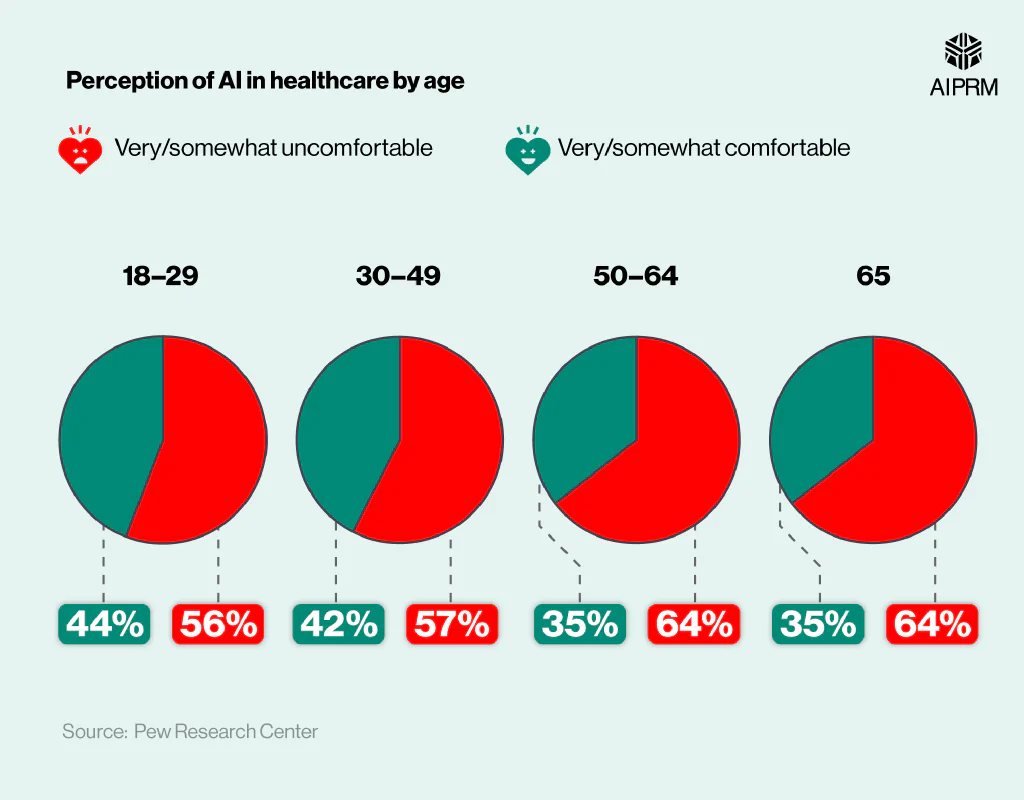
Pew Research Center data shows that older US adults are the most uncertain about AI being used within healthcare. Of those surveyed, nearly two-thirds (64%) of respondents over 50 were either very or somewhat uncomfortable with the concept.
Younger US adults were more open to the idea, with close to half (44%) saying that they would feel either very or somewhat comfortable with the concept.
A breakdown of the perception of AI in healthcare by qualifications #
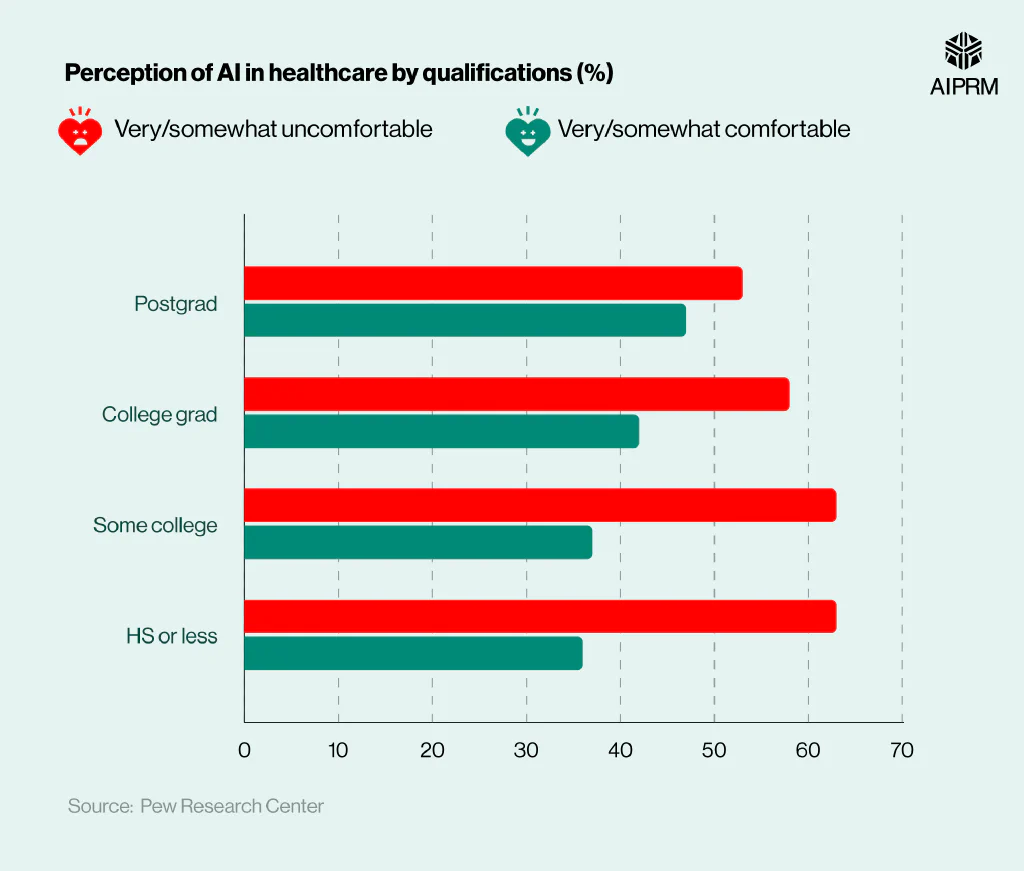
Respondents with higher qualifications were generally more comfortable with AI in healthcare than those who had not attended college. Close to half (47%) of postgrads were either very or somewhat comfortable with AI being used in the health sector, which is 11% more than those with a High School diploma or less.
However, across all qualification brackets, more people were uncomfortable with the concept of AI in healthcare than were comfortable.
A breakdown of what US adults think AI in healthcare will help with #
| Worse | Better | No difference | |
|---|---|---|---|
| The number of mistakes made by healthcare providers | 27% | 40% | 31% |
| The job that healthcare providers do is to treat people of all races and ethnicities fairly | 15% | 38% | 46% |
| The quality of healthcare for people like you | 30% | 31% | 38% |
| The security of patients' personal health records | 37% | 22% | 39% |
| Patients’ relationship with their healthcare providers | 57% | 13% | 29% |
Where there were benefits to be found for AI in healthcare, patients felt that AI would reduce the number of mistakes made by healthcare providers. Four in 10 (40%) respondents felt this would be the case, with AI being a useful backup resource for doctors and nurses.
US adults were most concerned about the impact AI would have on the security of patients’ personal health records as well as patients’ personal relationships with their healthcare providers. Nearly six in 10 (57%) felt that their connection with their doctor would get worse as a result of AI playing a more integral role in the sector.
How do doctors feel about AI? #
AI in healthcare statistics indicate that doctors across all departments believe that AI has a role to play within the sector.
Broken down by profession in the healthcare sector, those who worked in Pathology had the most faith in AI in healthcare, whereas Psychiatrists were the least optimistic.
A breakdown of what doctors think AI will likely be able to do #
| Psychiatry | Pathology | Radiology | Surgical Specialities | Average | |
|---|---|---|---|---|---|
| Provide documentation | 49% | 73% | 35% | 38% | 49% |
| Provide emphatic care to patients | 9% | 13% | 6% | 8% | 9% |
| Formulate personalized medication and/or treatment plans for patients | 30% | 60% | 65% | 46% | 50% |
| Evaluate when to refer patients to outpatient vs. inpatient treatment or consultation | 33% | 73% | 53% | 51% | 53% |
| Analyze patient information to establish prognoses | 67% | 87% | 71% | 64% | 72% |
| Analyze patient information to detect the possibility of criminal behavior/assault | 35% | 40% | 35% | 36% | 37% |
| Analyze patient information to detect self-harmful behavior | 44% | 53% | 35% | 23% | 39% |
| Synthesize patient information to reach diagnoses | 72% | 73% | 65% | 64% | 69% |
| Perform a physical examination, including mental status examination | 16% | 33% | 29% | 31% | 27% |
| Interview patients in a range of settings to obtain medical history | 51% | 80% | 29% | 59% | 54% |
| Average for each task | 41% | 59% | 42% | 42% | 46% |
(Source: National Library of Medicine)
Of those who worked in the field of Psychiatry, the leading response was that AI could be used to synthesize patient information to reach a diagnosis. More than seven in 10 (72%) believe that AI will likely be able to help with this.
Psychiatrists were skeptical about AI providing empathetic care to patients, with just under one in ten (9%) believing that the technology could perform this function. However, Radiologists were the most skeptical, with just 6% in this role believing that AI could fulfill this function.
Doctors in the field of Pathology were most optimistic about AI being used to establish patient prognosis, with nearly nine in 10 (87%) believing that AI will likely be able to do this in future.
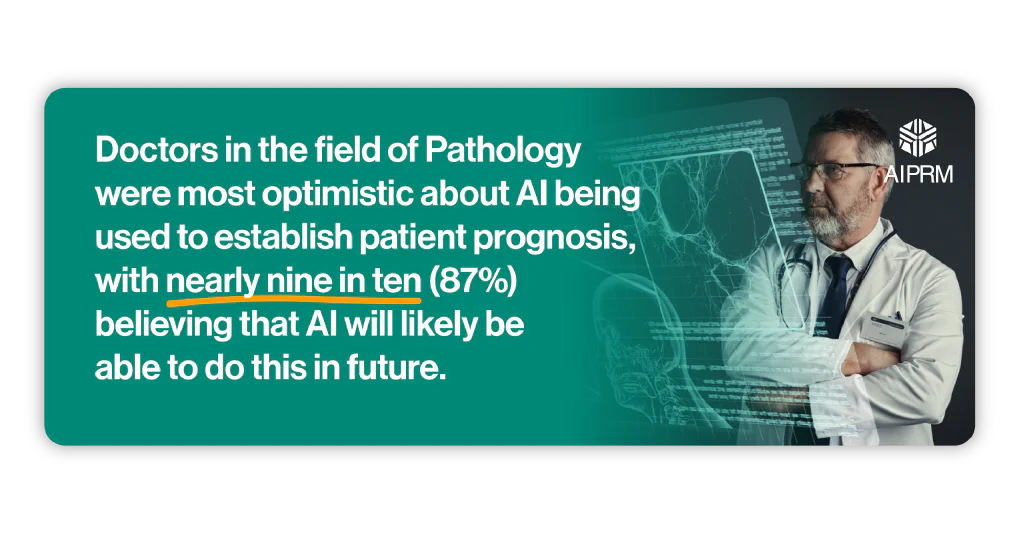
A breakdown of how likely AI will be able to deliver certain benefits and drawbacks for patients #
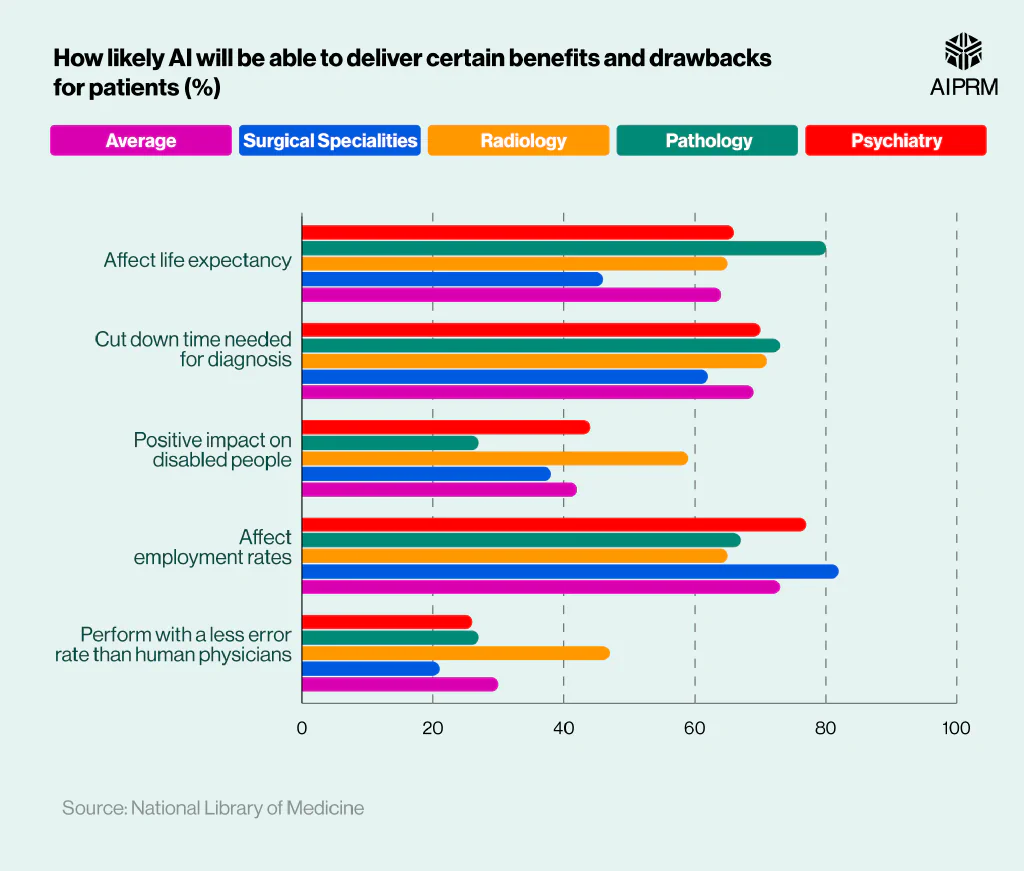
Across the board, doctors felt the biggest consequence of AI in healthcare would be the impact on employment rates. Close to three-quarters (73%) felt that this was a likely consequence of more AI in the health sector, with those who work in surgical specialities being the most concerned. More than eight in 10 (82%) feel this would be a likely drawback – 15% more than doctors who worked in Pathology.
AI in healthcare statistics from the National Library of Medicine also indicate that doctors were skeptical of AI performing fewer errors than humans. Overall, just three in 10 (30%) felt this was the case. However, nearly half (47%) of radiologists felt it would reduce human error. This is 26 percentage points more than those who work in surgical specialities.
A breakdown of the perceived value of AI in healthcare compared to prior expectations in the United States as of 2021 #
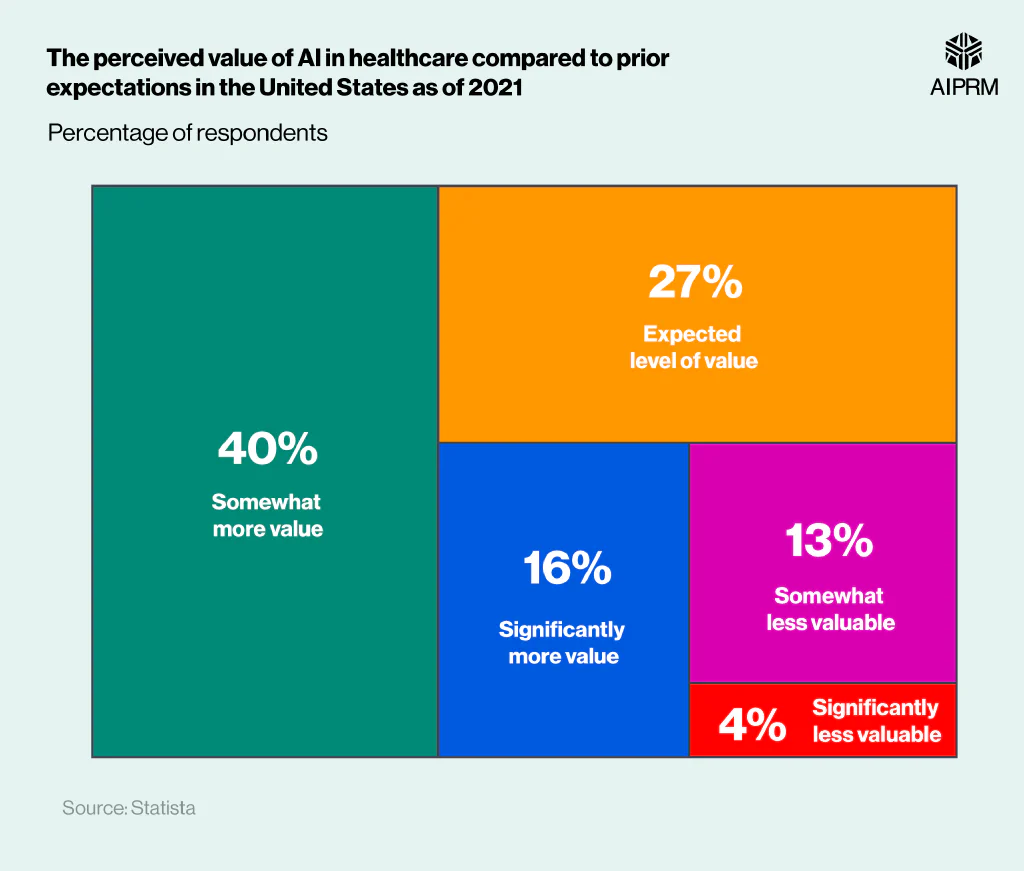
AI in healthcare statistics show that AI is exceeding expectations in terms of its perceived value before 2021. Data from Statista shows that four in 10 (40%) respondents believe the market is worth more than expected. The next most common answer was that it had “achieved the expected level of value” – a view felt by just over a quarter (27%) of respondents.
This means that more than four-fifths (83%) of respondents felt AI in healthcare was either hitting its expected level of value or exceeding it. Less than a fifth (17%) of people felt AI was underachieving in its perceived value.
A breakdown of the share of users who agree with the following statements regarding the impact of AI in healthcare within EU countries #
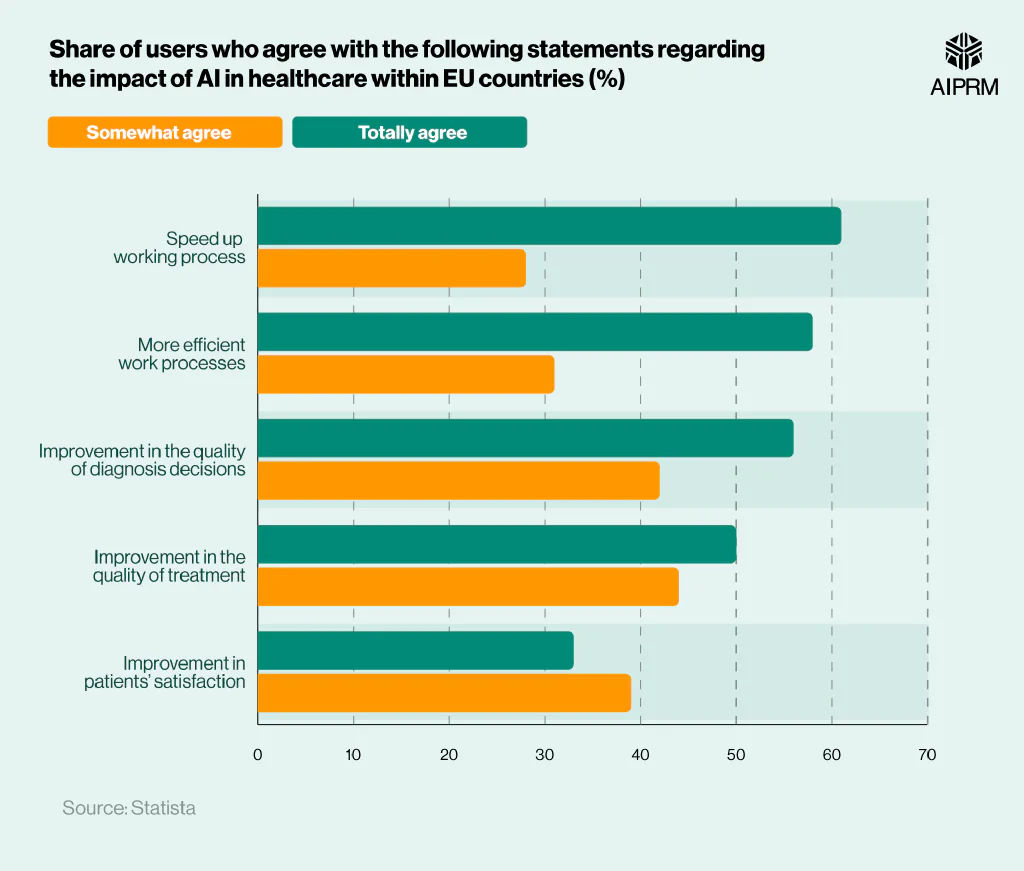
According to data from Statista, nearly nine in 10 (89%) totally or somewhat believe AI will speed up processes. This means just 11% are either neutral on the matter or believe it will slow the working process down.
The same positive sentiment is found regarding improving the efficiency of working processes and the quality of diagnoses, with 58% and 56% of respondents totally agreeing with these statements, respectively.
A further 50% strongly believed that AI would improve the quality of treatment.
The only statement that respondents ‘somewhat agreed’ more than strongly agreed was regarding the improvement in patients’ satisfaction. Almost four in 10 (39%) somewhat agreed that AI would improve patient satisfaction to some degree, compared to only a third (33%) who strongly agreed.
FAQs about AI in healthcare #
How is AI used in healthcare?
AI is used in healthcare for various processes, including analyzing complex medical data, improving diagnostic accuracy, creating more personalized treatment plans, and enhancing the operational efficiency of hospitals and clinics.
When was AI first used in healthcare?
AI was first introduced into healthcare in the 1980s with the development of expert systems like MYCIN. These were designed to help diagnose infections and recommend specific antibiotics.
AI in healthcare has since evolved to include more sophisticated machine learning models for predictive analysis, real-time decision support systems, and advanced imaging technologies.
What are the benefits of AI in healthcare?
The three main benefits of AI in healthcare are:
- AI algorithms improve the accuracy and speed of medical diagnoses, often detecting conditions from images or data that would take much longer for a human to analyze
- AI also helps to tailor treatments to individual patients by analyzing genetic information, lifestyle, and previous responses to drugs, antibiotics and other treatments.
- Another key benefit is that AI streamlines administrative tasks in healthcare settings, reducing costs and allowing medical staff to focus more on patient care.
What is the future of AI in healthcare?
AI is expected to grow considerably in the coming years and become a more integral part of the health sector. AI could become more deeply integrated into patient care, both in terms of storing patient data but also in their treatment. With the use of AI modelling, doctors may be able to spot signs of cancer or heart disease quicker than before, not only ensuring better prognosis for patients but also potentially saving governments millions, if not billions, of dollars.
Sources #
https://www.grandviewresearch.com/horizon/outlook/ai-in-healthcare-market-size/global
https://www.statista.com/statistics/1312566/adoption-stage-of-ai-in-healthcare-in-the-eu/
https://www.ncbi.nlm.nih.gov/pmc/articles/
https://www.n-ix.com/generative-ai-in-healthcare/
https://builtin.com/artificial-intelligence/artificial-intelligence-healthcare
https://implementationscience.biomedcentral.com/articles/
https://www.ncbi.nlm.nih.gov/pmc/articles/PMC10073828/
https://www.statista.com/statistics/1256760/value-of-ai-in-healthcare-in-the-us/
https://www.statista.com/statistics/1313872/opinion-on-impact-of-ai-in-healthcare-in-the-eu/